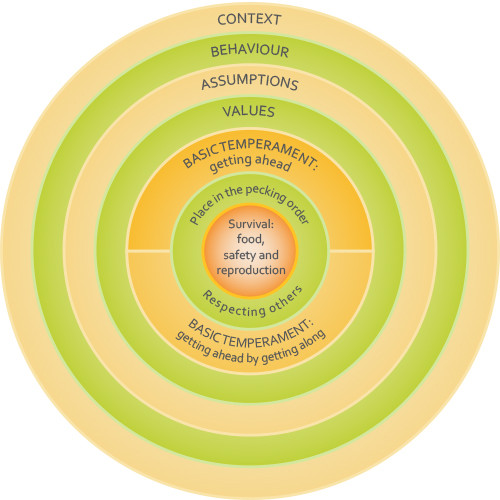I’ve introduced the three underlying principles of New Leadership. The idea that employees are autonomous, meaningful partners, driven by the natural desire to behave according to these natural ways of being.
And yet, across our organizations, human characteristics also prevent these from becoming practice. What are these characteristics and how do they guide our behavior? Can we overcome a ‘pecking order’ mentality?
This diagram is a useful way to summarize the fundamental human motives that drive us:

Everything begins with the essence of life: survival and passing through life. To that end, one needs food, safety, and the opportunity to reproduce. Now, whether you enjoy this depends largely on your position in the pecking order.
From an admittedly simplistic view, one could say that there are two strategies to get your place in the pecking order or group: getting ahead and getting ahead by getting along.
Getting ahead is a strategy based on dominance and taking your place with force and assertiveness or aggressiveness.
Getting ahead by getting along is a strategy that originated from our lived experiences: that everyone’s chances at survival increase if they live and work together in a group. One acquires their place by working together and giving something to the group or powerful members within the group.
Because this evolution started millions of years ago, we can safely assume that cooperation and morality have since become embedded in the human brain. The background to this is described by Patrick Vermeren in his book Anders Leiden [Leading differently].
Your basic temperament, in combination with your education and your experience, leads to emotions, values, and opinions that direct and/or explain your behavior. One of both strategies (getting ahead or getting along) will likely determine an individual’s preference for either in different contexts.
The relationship between behavior, opinions, and emotions is still a heated discussion topic in psychology.
Cognitive psychology traditionally proclaims that your opinions determine how you feel and behave. New directions pretend that the opposite is true: your emotions determine your behavior and your opinions serve to give everything meaning.
This is supported by recent studies demonstrating that you often begin to act, driven by the emotional brain, before you have rationally made the decision to act. Your hand is already reaching out, even before you have rationally made the choice to slap someone. Your emotional brain makes the decision, specifically in situations in which your life or your dignity is in danger.
Either way, this interaction between emotion and reason leads to conscious behavior, but even more often to unconscious and emotionally controlled behavior – most of the learning takes place unconsciously.
Without knowledge of this interaction, the behavior in question is not always easy to indicate or to understand. It also leads to numerous misunderstandings between people and between managers and employees.
Some examples:
- You have learned to stand up for yourself in order to disguise your uncertainty and maintain your self-respect.
- Result: you always choose attack as the best defense.
- You learned to keep everything under control from a certain degree of dominance.
- Result: you set yourself up as a dominant and controlling person.
- You learned to earn respect by not making any mistakes.
- Result: you see imperfections everywhere and all your attention is often focused on preventing mistakes.
- You had to fight for your place and this has taught you to object in a non-aggressive way.
- Result: you try to take your place sub-assertively.
- You learned to always acknowledge and help others to gain respect and appreciation in the same way.
- Result: you have become very accommodating.
It is always about the struggle for your place in the pecking order and the protection of your dignity and self-esteem.
In my next article, I will look at how this ‘pecking order mentality’ can often translate into unhealthy behaviors in the workplace, and how we can overcome them in our pursuit of an alternative, more adaptive approach: Motivation 3.0.
